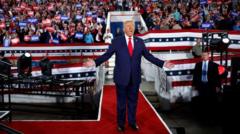President-elect Trump's known skepticism towards climate science raises concerns about the effectiveness of ongoing global efforts to combat climate change, especially in raising funds for vulnerable countries.
Trump's Return to Power Poses Major Challenges for Global Climate Initiatives

Trump's Return to Power Poses Major Challenges for Global Climate Initiatives
Experts warn that Donald Trump's election victory threatens immediate progress in tackling climate change, particularly ahead of COP29.
Donald Trump's anticipated return to the White House has the potential to significantly derail international efforts aimed at curbing climate change, particularly as world leaders prepare to convene next week for COP29. Experts caution that while the immediate consequences may be dire, the long-term impact on climate action remains uncertain.
With Trump’s history of deriding renewable energy initiatives as a "scam," his presidency is expected to obstruct efforts to cut emissions and hinder financial assistance aimed at helping developing nations. As members of the global community gather in Azerbaijan for crucial discussions, opinions are mixed on whether the meeting can yield substantial agreements.
"Trump's victory will likely present a formidable barrier to progress at COP29," stated climate policy expert, Prof. Richard Klein from the Stockholm Environment Institute. "Countries like China may also be disinclined to commit to further actions if the US cannot make binding agreements."
Historically, Trump's past actions included withdrawing the US from the Paris Agreement, a pivotal global treaty focused on climate mitigation. Should he choose to withdraw again, he could establish alternative policies without needing to face international scrutiny. This situation raises concerns, as it creates an air of unpredictability at the global talks.
Notably, during his previous administration, Trump took the US out of the Paris Agreement while the withdrawal process extended through the end of his term. If he opts to exit once more, he could reshape US climate policy for three years, free from the obligations imposed by the treaty.
In light of this shift in leadership, climate advocates are worried about the implications for climate financing, particularly for developing nations that require billions for sustainable transition. "The likelihood of China and other major polluting countries contributing to funding is now diminished," Prof. Klein added.
Trump’s promise to expand fossil fuel exploration in the U.S. and rollback environmental protections poses questions about the future of clean energy investments. Industry figures, such as Dan Eberhart, CEO of Canary LLC, support a renewed focus on fossil fuels, emphasizing a "drill baby drill" philosophy.
While the current political landscape appears bleak, experts emphasize that the transition to renewable energy may still persist despite Trump’s presidency. Former UN climate chief Christiana Figueres remarked, “This election may pose challenges for global climate action, but it won't halt the necessary transition to a decarbonized economy."
As the world watches and waits for the COP talks to unfold, many hope the momentum towards sustainable energy will outweigh the potential setbacks introduced by the new administration.




















